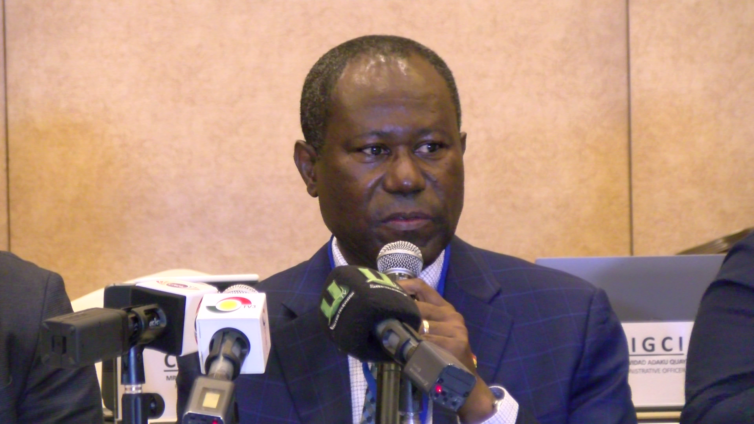The Ghana Cocoa Board (COCOBOD) has successfully obtained a US$100 million financing facility from the World Bank, aimed at rehabilitating aged cocoa farms across six key cocoa-growing districts in the country.
The project will cover Assin Fosu, New Edubiase, Nkawkaw, and Juaso districts.
This four-year initiative focuses on rejuvenating cocoa farms by cutting down trees that have lived for over 20 years, preparing the land, and providing necessary planting materials such as seedlings and plantain suckers.
The Chief Executive Officer of COCOBOD, Mr. Joseph Boahen Aidoo, shared these details during a media interaction on July 4, 2024, as part of a field visit to farms in Assin Fosu in the Central Region.
During the visit, aimed at evaluating the efforts of extension officers and government interventions, Mr. Boahen Aidoo explained that while the trees to be cut down are not diseased, they have outlived their productive lifespan, with some exceeding 30 years and becoming unproductive.
“Once cocoa hits 20 years and above, it has spent its life span, and from that stage, you realise that it bears no fruits, no pods, and the flowers don’t come, yet the farmer would be maintaining such a farm, and this is not productive,” he noted.
The rehabilitation project is expected to rejuvenate these farms, thereby boosting cocoa production. COCOBOD will support farmers with plantain suckers and labor for planting, along with providing extension officers to educate and assist farmers in managing their farms for optimal yields.
Mr. Boahen Aidoo emphasized the necessity of comprehensive support, noting that simply providing seedlings would not be sufficient for the farmers to achieve the desired outcomes.
Highlighting the scale of the project, he mentioned an example where farmers were working on a 30-hectare farm.
“If you cut the trees from this 30-hectare land, and you want the farmer to provide plantain suckers within one year, they cannot. That’s why we’re supporting them,” he explained. He also referenced a similar project executed with support from the African Development Bank (AfDB), which aimed to combat the Cocoa Swollen Shoot Virus Disease (CSSVD).
During the visit, farmers urged the government to expedite the construction of roads in cocoa-growing areas to facilitate the transport of produce and reduce post-harvest losses.
They also called for more extension officers, acknowledging the significant help provided by these officers in their farming activities.
Nana Kweku Appotoi IV, Aboabohene of Assin Nyankomase, lamented the poor road conditions in cocoa-growing communities and urged COCOBOD to lead efforts in improving the infrastructure.
Responding to these concerns, Mr. Boahen Aidoo assured farmers that the government would allocate funds to improve roads in cocoa-growing areas following recent increases in cocoa prices.
He advised farmers on best practices, such as avoiding cocoa cultivation in sandy and clay soils, not burning weeds, and using tree branches as mulch rather than selling them as firewood.
He also cautioned against the use of harmful weedicides and materials like poultry manure, which can damage soil health and reduce crop yields.
Mr. Boahen Aidoo highlighted COCOBOD’s efforts to equip farmers with modern tools, noting that since 2020, they had procured about 100,000 motorized slashers and pruners to help clear cocoa farms and increase production. He encouraged farmers to access these tools from various district offices.
Additionally, he pointed out that COCOBOD had improved the extension officer-to-farmer ratio from one officer per 3,000 farmers to one officer per 600 farmers, nearly meeting the Food and Agriculture Organization’s (FAO) standard of one officer per 500 farmers.

